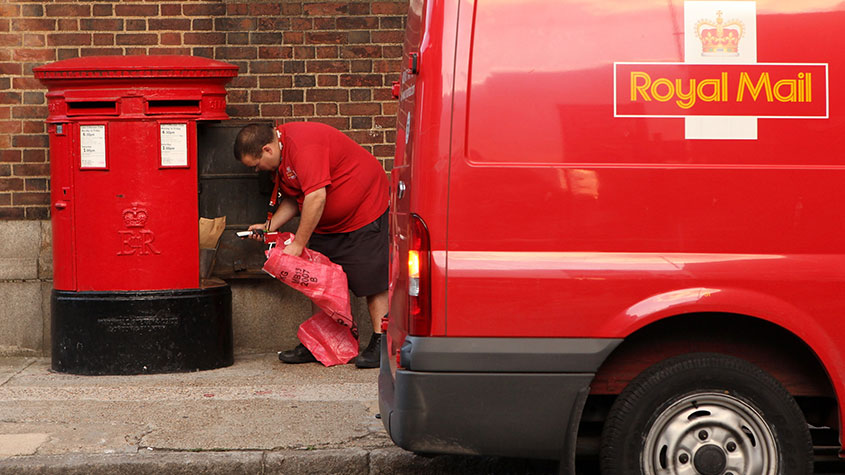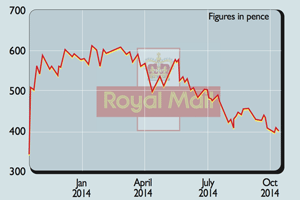Was the Royal Mail sold off too cheaply?
Was the British public betrayed by an overzealous government in the Royal Mail sell-off? Emily Hohler reports.

Get the latest financial news, insights and expert analysis from our award-winning MoneyWeek team, to help you understand what really matters when it comes to your finances.
You are now subscribed
Your newsletter sign-up was successful
Want to add more newsletters?

Twice daily
MoneyWeek
Get the latest financial news, insights and expert analysis from our award-winning MoneyWeek team, to help you understand what really matters when it comes to your finances.

Four times a week
Look After My Bills
Sign up to our free money-saving newsletter, filled with the latest news and expert advice to help you find the best tips and deals for managing your bills. Start saving today!
The sell-off of the Royal Mail an "ode to privatisation" has been an "extraordinary success", says Fraser Nelson in The Daily Telegraph. It was hugely over-subscribed and in the end around 690,000 investors were allocated shares worth £750.
The decision that those who applied for more than £10,000 of shares would get nothing was a "brilliant idea" that embodies popular capitalism. Protests are now almost "inaudible" a reminder that the "British public is moving to the right just when [Ed] Miliband is moving to the left".
Labour leader Ed Miliband has been "royally trumped" by the sell-off, which was aimed "squarely" at what he calls the "squeezed middle", agrees Matthew d'Ancona in The Sunday Telegraph.
MoneyWeek
Subscribe to MoneyWeek today and get your first six magazine issues absolutely FREE

Sign up to Money Morning
Don't miss the latest investment and personal finances news, market analysis, plus money-saving tips with our free twice-daily newsletter
Don't miss the latest investment and personal finances news, market analysis, plus money-saving tips with our free twice-daily newsletter
The great popular privatisations of the 1980s were driven by Margaret Thatcher's ambition to create more shareholders in Britain than there were trade union members. "It is at the heart of the Conservative ethos that homeowners and shareholders" are better off without interference from the state.
It is precisely in this context that David Cameron and George Osborne view their Help to Buy scheme, even if it is a "profound paradox: state intervention to reduce dependency on the state".
I'm all in favour of privatisation, says Ross Clark in The Times. "We have seen one state-owned operation after another turned into a sparkling business after being freed from political management."
But it is clear that the government has done all it can "to remove the ugly bits while leaving the juicy bits". It has shifted £37.5bn of pension liabilities to the Treasury, backed by a pension fund worth £9bn less than this, and allowed the Royal Mail to retain ownership of prime land in London, although the company has said it doesn't need it for its operations.
Even Thatcher never came up with the idea of "forcing taxpayers to hold on to the pension liabilities of the nationalised industries she privatised".
There has been much whingeing about taxpayers being short-changed, and it is clear that the Royal Mail was "priced to go" from the start, says Mike Ingram in the Daily Mail. But it is "actually very tricky to value companies for the very long term".
Royal Mail had no share price as a reference point and very little track-record. Three years ago, it was making a loss. If the government had been greedy, it might have "torpedoed the deal".
As for the popular narrative that shares have largely ended up in the hands of speculators, institutional investors are usually earmarked for the lion's share of an initial public offering (IPO) because they tend to be long-term holders of equity and a stable shareholder base is important. It may make for "dull press", but on balance the sell-off probably wasn't a "rip off".
Get the latest financial news, insights and expert analysis from our award-winning MoneyWeek team, to help you understand what really matters when it comes to your finances.

Emily has worked as a journalist for more than thirty years and was formerly Assistant Editor of MoneyWeek, which she helped launch in 2000. Prior to this, she was Deputy Features Editor of The Times and a Commissioning Editor for The Independent on Sunday and The Daily Telegraph. She has written for most of the national newspapers including The Times, the Daily and Sunday Telegraph, The Evening Standard and The Daily Mail, She interviewed celebrities weekly for The Sunday Telegraph and wrote a regular column for The Evening Standard. As Political Editor of MoneyWeek, Emily has covered subjects from Brexit to the Gaza war.
Aside from her writing, Emily trained as Nutritional Therapist following her son's diagnosis with Type 1 diabetes in 2011 and now works as a practitioner for Nature Doc, offering one-to-one consultations and running workshops in Oxfordshire.
-
 Can mining stocks deliver golden gains?
Can mining stocks deliver golden gains?With gold and silver prices having outperformed the stock markets last year, mining stocks can be an effective, if volatile, means of gaining exposure
-
 8 ways the ‘sandwich generation’ can protect wealth
8 ways the ‘sandwich generation’ can protect wealthPeople squeezed between caring for ageing parents and adult children or younger grandchildren – known as the ‘sandwich generation’ – are at risk of neglecting their own financial planning. Here’s how to protect yourself and your loved ones’ wealth.
-
 Royal Mail’s 7.2% dividend yield is now under threat
Royal Mail’s 7.2% dividend yield is now under threatTips Royal Mail's dividend yield is coming under pressure as costs rise and delivery volumes fall. Profits are under threat, and investors can't take anything for granted, says Rupert Hargreaves.
-
Share tips of the week
Features MoneyWeek’s comprehensive guide to the best of this week’s share tips from the rest of the UK's financial pages.
-
 If you’d invested in: Wizz Air and Royal Mail
If you’d invested in: Wizz Air and Royal MailFeatures Wizz Air is the largest low-cost airline in central and eastern Europe – and it is flying high.
-
Company in the news: Royal Mail
Features Phil Oakley explains what the dramatic collapse of competitor City Link means for Royal Mail.
-
 Shares in focus: Can Royal Mail deliver profits?
Shares in focus: Can Royal Mail deliver profits?Features Pessimism surrounds the mail service’s prospects. Is it overblown, and should you buy the shares? Phil Oakley investigates.
-
Company in the news: Royal Mail Group
Features Shares in Royal Mail were a steal at their flotation price, but have now fallen back as the company has run into a few problems. Phil Oakley asks if it's time to buy.
-
Company in the news: Royal Mail Group
Features Royal Mail shares looked tempting before the float. But, now the shares have risen in price, is it too late to buy? Phil Oakley reports.
-
Royal Mail shares soar to new highs - should you bank profits?
Features As ‘unconditional trading’ starts in Royal Mail shares, the price has soared to new highs. Ed Bowsher looks at whether you should sell now, or hold on to them.